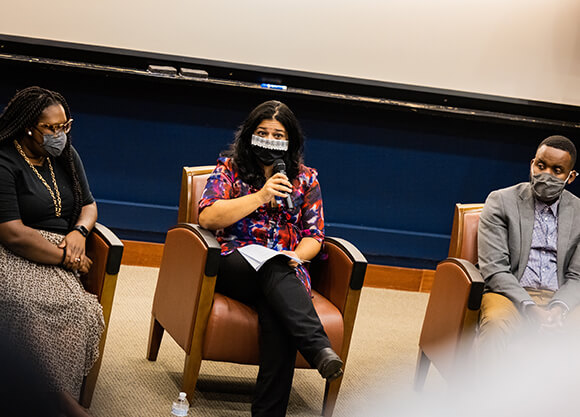
Panelists call for action, compassion for Haitian migrants
October 13, 2021

October 13, 2021

Domestic criticism has grown over the past two weeks when the media circulated images of U.S. border agents on horseback running down refugees crossing the Rio Grande, triggering a national debate on U.S. immigration policy in the U.S.
Sponsored by the Department of Cultural and Global Engagement, the event was moderated by Director of Multicultural Education and Training Daymyen Tyler Layne, who led three panelists through a range of topics, including the historical context on the current situation and how U.S. immigration laws are affecting asylum seekers.
“Tonight, we seek to discuss a very pressing issue in our country now and throughout the United States history, asylum and immigration laws,” said Layne. “Haitians in this country make up one of the largest Caribbean immigrant populations in the United States. This discussion sparked as we all witnessed the footage that not only show the gross mistreatment of our Haitian brothers and sisters seeking asylum but that tell us certain things about our country and how we are managing asylum policies. As Haitian migrants were seeking refuge under a bridge in Rio Grande, Texas, they were really seeking stability and the concept of the American dream.”
The three panelists included Quinnipiac third-year law student Djess Jacques, president of Quinnipiac’s Black Law Students Association; Sujata Gadkar-Wilcox, PhD, associate professor of legal studies at Quinnipiac; and Bianca Jordan, Esq., an immigration attorney at Brazen Legal, PLLC. The panelists drew upon professional expertise as well as personal experience to lead a discussion that was both insightful and educational on the role of U.S. immigration policies on the world stage.
“What is particularly unique about what is happening at the border now is that migrants who are trying to get into the country are not being given the opportunity to state their asylum claim,” said Jacques, a first-generation Haitian American. “They are being extrajudicially deported back to their country. A lot of them haven’t been to Haiti in ten years after they left from the 2010 earthquake and settled in Latin America, Brazil or Mexico. They took a long, dangerous journey to Mexico and they’re waiting for an opportunity to be processed. It’s a Civil Rights issue as well as a Civil Liberties issue, and it’s wrong.”
As executive director of the Oxford Consortium on Human Rights specializing in constitutional, international and human rights law, Gadkar-Wilcox agreed.
“In some ways, this is not new. Since the 1940s, we’ve had human rights principles. We had human rights protections in place that the United States had taken the lead on, such as the Universal Declaration of Human Rights,” said Gadkar-Wilcox. “We have to ask if we are violating our commitment to the refugee convention and to domestic law.”
Gadkar-Wilcox explained that when we are talking about the right to asylum, it is a matter of the right to due process. “It’s about the right to be heard if you’re claiming that you are being returned to a place where you will be tortured. There is a process in place with a judge to determine the credibility of that fear.”
The panelists emphasized the importance of changing the narrative in the U.S. to focus on the benefits of immigration and a general agreement on the principles of dignity and equality.
“How can we come up with a policy on immigration that accounts for things from a human rights perspective, with a basic core focus on human dignity, equality and due process?” added Gadkar-Wilcox. “Ensuring that those things are guaranteed would actually be the minimal requirements in international law.”
The panelists explored how recent events have heightened awareness among the U.S. mainstream media, including how the pandemic has impacted due process, the child separation policy, Anti-Blackness and colorism in the law, and the state of detention facilities at the border.
A prominent immigration attorney at Brazen Legal, PLLC, and founder of Modern Immigration, Bianca Jordan, discussed how Anti-Blackness has impacted immigration law.
“Haitian immigrants are treated against two levels of discrimination,” said Jordan. “We would often hear about Mexican immigrants coming here, but not about Black immigrants in Latin America seeking asylum. I think it is telling that the media is now focusing on these Black nationals and sharing their story.”
The panelists concluded the discussion by taking questions with audience participants and urging a change in the narrative regarding the acceptance of refugees in the United States.
Get the latest news and events sent right to your email by subscribing to Quinnipiac Today.
Subscribe